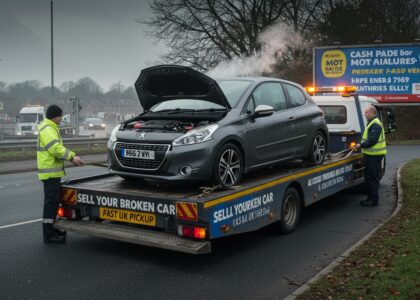Selling a car with electrical faults can feel challenging, especially when potential buyers are concerned about repair costs and reliability. Electrical systems in vehicles are complex, ranging from simple wiring to advanced control modules. Whether the problem is a faulty alternator, damaged wiring harness, or malfunctioning ECU, these issues often reduce the car’s resale value. However, you can still find ways to sell such a vehicle fairly quickly while ensuring you get a reasonable return. By understanding your options and presenting your car honestly, selling becomes much easier.
Understanding common electrical problems in cars
Electrical faults can range from minor issues to more serious failures. Problems such as a weak battery, faulty starter motor, or malfunctioning lights are often affordable to fix, while wiring faults or ECU failures can be expensive. Warning lights on the dashboard, difficulty starting, or inconsistent electronic functions are common signs. Buyers may be wary, but many specialists and traders still accept such vehicles. If you are thinking, “I want to sell my car fast despite these problems,” the key is being upfront about the condition and seeking buyers who specialise in faulted vehicles.
Who buys cars with electrical issues
Not every buyer is put off by electrical faults. Trade dealers, scrap yards, and specialist car buyers often purchase vehicles in less-than-perfect condition. Many of these businesses have access to parts and repair facilities, which allows them to manage repairs at a lower cost. This makes it worthwhile for them to buy your car, even if the electrics are not working perfectly. If you are considering how to get offer for my car when it has faults, contacting these buyers directly is often more effective than trying to sell privately.
Maximising the value of your vehicle
Electrical faults can reduce your car’s value, but you can still secure a reasonable deal. Start by gathering repair quotes so you know what the issues are worth. Having service records, MOT history, and proof of ownership also helps buyers feel more confident. Some sellers invest in minor fixes, like replacing a battery or repairing light circuits, to boost the selling price. When you try to value my car, remember that transparency is key. A realistic price combined with full disclosure makes the process quicker and avoids disputes later.

Selling options available in London
For many car owners, location plays a big role in selling. Large cities such as London offer many opportunities to sell faulty cars, from private buyers to professional services. Online platforms and local traders often advertise as specialists in non-running or damaged vehicles. If you are thinking about how to sell my car London with electrical faults, contacting such buyers gives you a better chance of getting a competitive price. Many also offer collection services, which save you the hassle of arranging transport.
Tips for a smooth selling process
To make the sale stress-free, prepare all paperwork in advance, including the V5C logbook, MOT certificate, and any repair reports. Be honest when describing the condition, as this avoids future problems with buyers. Always compare offers from different sources rather than accepting the first deal you receive. Keeping communication clear and professional increases trust and helps speed up the process. For business owners, traders, and individuals alike, selling a car with electrical faults is easier when you know the right steps and reach out to the right market.
If you are ready to sell a car with electrical faults quickly and fairly, get in touch with Cars Wanted UK for a hassle-free solution.





